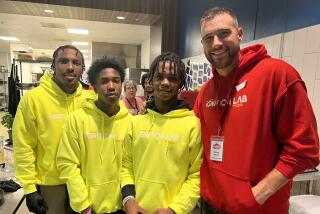Marching band takes Chiefs name to D.C. after all
- Share via
WYANDOTTE, MICH. — Noses red, lips blue, fingers freezing in the January cold, the high school band members formed ranks and marched off campus to the clattering of drums and the brassy strains of “Stars and Stripes Forever.” They proceeded down Maple and crossed over to Elm, bringing little children and barking dogs to the front windows of the neighborhood’s tidy bungalows.
Thursday’s scene could have been painted by Norman Rockwell, although the context might well have baffled the master of Americana. For this was not just another high school band at after-school practice. No, these shivering trombonists and flag twirlers were, drum roll please, the Wyandotte Marching Chiefs, bound for Pennsylvania Avenue and the inauguration -- but only after a one-day field trip past the fun-house mirrors of modern American discourse.
It had begun with a front-page report that morning in the Detroit Free Press: Because of a 26-page complaint lodged by a retired Wisconsin business management professor who polices uses of Indian names and images, looking for impropriety, the band would not be performing at the inauguration as the Wyandotte Marching Chiefs.
It would be identified instead as the Roosevelt High School Marching Band. Moreover, uniform patches that depict a chief in full bonnet, worn on the shoulders of Marching Chiefs for more than half a century, would be covered up for the big day. And the Marching Chiefs banner that leads the way would not make the trip.
“We just don’t want to bring any negative publicity,” band director Mark D’Angelo told the newspaper.
Well, it’s an easy guess what happened next. This isn’t Rockwell’s America anymore. This is the America of the 24-hour news cycle and morning radio zoo and anonymous Internet flame-throwers. By dawn’s early light D’Angelo and the school were being roasted in chat rooms coast to coast for caving in to what most of the critics considered excessive political correctness.
Television news vans raced to the campus. Radio stations began calling. Media madness descended on this little suburban town hard by the Detroit River with the fury of a Great Lakes winter storm.
So school officials regrouped. They consulted with alums and community leaders and a local Native American group. As they worked toward a decision to reverse course, they received a public relations coup from out of the blue, or at least Oklahoma.
A Detroit radio station tracked down Leaford Bearskin, chief of the Wyandotte Nation, which lived here centuries ago and gave the town its name.
The chief’s view was that the Marching Chiefs should keep their name and logo. They had, he said, his “blessing.” He backed this up with an “open letter” to the original objector, Harvey Gunderson of Osseo, Wis.
Gunderson, along with his wife, Carol, a retired sociology professor and a Native American, had lodged the complaint under the auspices of their organization, Religious Americans Against Indian Nicknames and Logos. In an interview, he said they had been involved in a dozen or so similar disputes and that previous opponents had trivialized their objections.
“What people don’t realize,” he said, “is that this is a matter relating to race.”
What would be the school’s position, the Gundersons asked in their letter to Roosevelt High School, if the band was named the Wyandotte Black Marching Chiefs?
“Or,” the letter continued, “considering that President-elect Obama’s roots include Kenya, suppose RHS adopted a Kenyan Kikuyu tribal chief as their stereotyping logo. Wouldn’t it create a nationwide scandal and be an embarrassment to both President-elect Obama and the Wyandotte community?”
They raised some valid points -- names do matter, stereotypes do hurt -- but Chief Bearskin, for one, wasn’t buying it.
In contrast to the Gundersons’ 13,500-word missive, Bearskin’s “open letter” was a model of brevity:
I am distressed that you failed to contact me prior to dispatching your opposition. There are only two people who can speak about such matters. I am one of them and the Chief of the Wyandotte Tribe of Quebec, Canada, is the other person. I speak to you personally -- Mind your own business!
Leaford Bearskin, Chief
Wyandotte Nation
And so now, even before one sun had gone down, the saga had come full circle. And D’Angelo’s voice soared as he addressed his charges, standing behind their restored Wyandotte Marching Chiefs banner.
“We are going to the parade,” he shouted, his cadence slow and dramatic, “with the blessing of Chief Bearskin of the Wyandotte Nation of Oklahoma! Those were the early Indians who settled here in Wyandotte. It’s pretty historic.
“It’s gotten bigger for you. You are not only representing your city of Wyandotte, and your school, and the state of Michigan. Now you are now also representing the Wyandotte Nation of Indians. . . . That’s pretty cool.”
He reminded the band members how hard they had worked to earn the trip -- not only beating out rival applicants from across the nation, rehearsing outdoors in the dead of winter, but also hustling to raise money, selling cheeses and sausages, raffling off performances, soliciting alumni.
“And now,” he said, “you are going to have the opportunity to be standing in the ultimate of arenas. It is going to be a great place to be.”
When the director was finished, the Marching Chiefs wheeled about and headed back to campus. And as they marched, the ones whose fingers could still move played “America the Beautiful.”
--
--
latimes.com/americanmoment
Road to the inauguration
Follow Peter H. King and photographer Kirk McKoy in this series as they wend their way to Washington for the Jan. 20 inauguration of Barack Obama, sending back reports from across the land in this time of transition.
More to Read
Sign up for Essential California
The most important California stories and recommendations in your inbox every morning.
You may occasionally receive promotional content from the Los Angeles Times.














